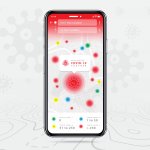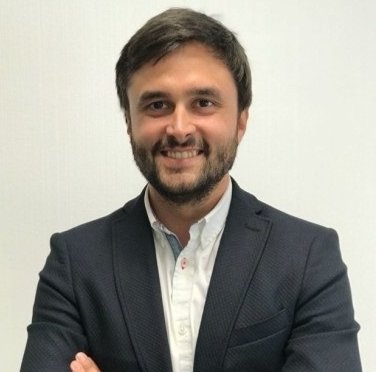Image source: Mediktor
Article • AI, apps and more
Digital health tools to fight Covid-19
A great deal of solutions using new technologies have been released to help tackle the Covid-19 pandemic and a panel of international experts shared a few examples during the Barcelona Health Summit last October.
Report: Mélisande Rouger
Building the Dutch contact-tracing app
Contact-tracing apps are an interesting option to manage a pandemic, but the creation process can take a long time and must meet several requirements, according to a Dutch official who spoke during the event that was held by Barcelona Health Hub, an association promoting innovation in digital health.

The Netherlands has just launched a national contact-tracing app early October but the project had been in the pipelines for six months, Roger Lim, Senior Policy Officer at the Ministry of Health, Welfare and Sport, explained. ‘It took a very long journey between first market consultation in March all the way to national rollout on 10th October,’ he said.
Lim and his team had to face a few challenges, starting with the widespread assumption that a contact-tracing app could be used to track people down. ‘We knew this perception was caused by stories of apps currently being used in countries like China and South Korea. Instead of ignoring these concerns, we tried to address them by opening transparent processes on the technical choices made. Privacy and data minimization were crucial to building the app. Trust is key for people to use it,’ he said.
To help build trust among users, the app developers chose not to upload the data to a central server, as using a different infrastructure would have raised questions over data privacy. The app is also fully adherent to the Google Apple Exposure Notifications protocol to reduce potential technical hiccups with Google and Apple operating systems. ‘We heard of other apps not being compatible with these systems, requiring to build bypasses and opening Bluetooth for a long time, so that was not very handy,’ he said.
Apps should not be regarded as THE solution to tackle the pandemic but as tool to support local healthcare services
Roger Lim
Besides the technical aspect, the Dutch developers also sought out the participation of behavioral scientists and epidemiologists to create the app. They are still taking in the input of academics and citizens to review the app and bring final improvements.
With 3.7 million downloads as of October 29th, the app had been adopted by 21% of the Dutch population (17.5 million). The app is here to complement the manual contract tracing efforts of the local healthcare services, not replacing those, Lim insisted. ‘An app should have added value to the current process of the local healthcare services. Apps should not be regarded as the solution to tackle the pandemic but as tool to support local healthcare services,’ he said.
Recommended article

Article • Digital health approaches
The struggle to create COVID-19 contact-tracing apps
While scientists recently confirmed the crucial role contact-tracing apps play in containing the COVID-19 pandemic, politicians are exploring which app architecture offers better privacy protection. However, there is no doubt that in Western countries such an entirely voluntary app can only be successful if the population at large supports it.
Digital health tools in Spain
‘Contact-tracing apps can potentially improve contact tracing capacities. In practice, we have to implement them in a better way, uptake must be higher and there must be no problem with security,’ said Dr. Jordi Serrano-Pons, founder of EpidemiXs and UniversalDoctor, who also spoke during the session.
EpidemiXs launched an app to spread knowledge among the population right at the start of Covid-19’s first wave early March. The tool was developed building on the expertise gained while working on similar tools that were released for the Zika virus and other outbreaks. ‘We aggregated a lot of validated information from hospitals and validated sources from governments and the WHO in a record time,’ Serrano-Pons said.
A challenge he and his team faced early March was the collapse experienced by Apple Store and Google Play platforms. The solution was to launch the app directly on a website, which received 1.3M visits just three days after the launch, and 2M so far. The company will launch another tool soon, to help researchers collect data more quickly and disseminate their studies in open data.

AI-fuelled symptom checkers can also help control infection rates, according to Miguel Muñoz, head of business development at Mediktor, a company offering such as a solution. The real challenge for these tools is that, to be effective, they have to provide a differential diagnosis, he explained during the event. ‘These solutions can be truly effective if they focus on the symptomatic patients, providing differential diagnosis and the most appropriate next steps for those suffering from another disease,’ he said.
AI-fuelled symptom checkers present with another key benefit for structures’ organization, he added. ‘These checkers can help healthcare providers to organize their peaks of high demands, avoiding saturation in primary care medicine,’ he concluded.
Profiles:
Roger Lim, MBA, is a senior policy officer at the Information Policy Directorate of the Dutch Ministry of Health, Welfare and Sports. In the international team of the directorate, he works on improving the cross-border interoperability of health data regionally and at EU level. He works to ensure the cross-border interoperability of the Dutch contact-tracing app CoronaMelder throughout the EU. Previously, he was seconded to the European Commission (DG SANTE) in the unit on Digital Health and worked for the health insurance directorate at the Dutch Ministry of Health, Welfare and Sports.
Miguel Muñoz is head of business development at Mediktor and is in charge of the company’s business in Latin Amercia, Africa and part of Europe. An economist who specializes in health insurance and eHealth, Muñoz has led the corporate business development and strategic partnerships department in Sanitas (BUPA) and has been involved in international digital health projects developing new ways of delivering healthcare to rural areas. He has also led projects to optimize claim costs whilst increasing customer satisfaction.
Dr. Jordi Serrano Pons, MD, is the founder and CEO of UniversalDoctor: The Digital Global Health Company, a winner of the United Nations World Summit Award for Global Champion of the mHealth category in 2016. UniversalDoctor aims to improve multilingual medical communication and to foster better health outcomes through the creation and use of innovative digital health tools in the global health space. A few months ago, the company created and launched EpidemiXs.
17.12.2020





